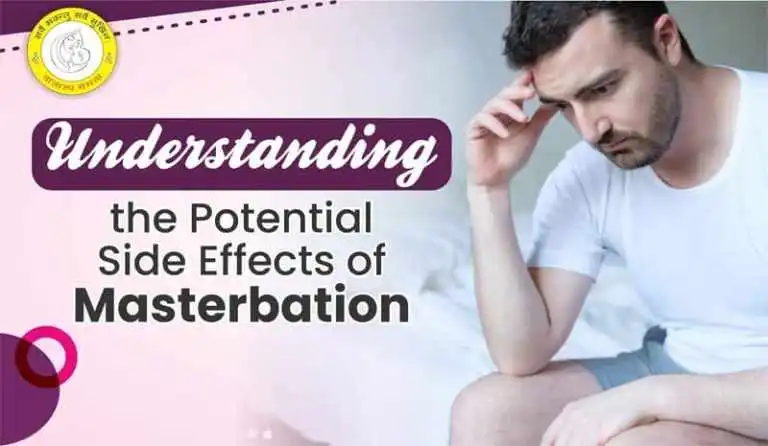Understanding the Hidden Side Effects of Masterbation

If you are here searching for the side effects of Masterbation, there are chances you are doing it and now you are feeling something wrong, or you are just planning to start it.
Masterbation is a common practice. Most people, regardless of gender, engage in it. While some experience orgasm during Masterbation, others may not. Despite its prevalence, many questions like – is Masterbation harmful, what could be the effects of Masterbation, or are there any benefits of Masterbation are still there in people’s minds. So, this blog is here just to clarify everything and make you conscious.
Before getting started, read this famous quote:
Masterbation is our first and natural form of sexual activity and if that’s inhibited or damaged, then we suffer for the rest of our lives. — Betty Dodson
In this Article
What is Masterbation?
You must know that masturbation is the act of achieving sexual pleasure through self-stimulation of the genitalia. It’s normal behaviour across all ages and genders. And if you are thinking whydo people do it? Let us tell you many people engage in masturbation for self-discovery, stress relief, and enjoyment. While most view it as a safe activity, cultural attitudes vary, and some may see it negatively.
Benefits of Masterbation
Below is the list of benefits of masturbation:
- Stress Relief: Yes, you heard it right! It can reduce stress, but how? By increasing brain neurotransmitters.
- Improved Mood: It helps elevate mood and can alleviate symptoms of depression.
- Better Sleep: It can enhance sleep quality by promoting relaxation.
- Sexual Exploration: It allows for self-exploration without pressure from a partner, building confidence and awareness of one’s sexuality.
- Pelvic Floor Health: You should know that regular masturbation may strengthen pelvic floor muscles and help prevent certain conditions.
- Pain Relief: You can even get relief from pain. Orgasms can release endorphins, acting as natural pain relievers for headaches or cramps.
- Safe Outlet: Also, offers a safe way to express sexuality. This also without the risks associated with partnered sex.
- Healthy Expression: Masturbation is part of being human. Embracing it can lead to body positivity.
Finding balance is crucial. If the effects of Masterbation disrupt daily life or cause discomfort, it’s wise to reassess. Seeking help from an infertility treatment centre in Patna is always an option.
Common Myths About Masterbation
Masterbation is often surrounded by myths, such as:
- It causes blindness or hair loss (not true).
- It’s only practiced by men or single individuals (everyone does it).
- It decreases sexual desire or performance (it often enhances sexual experiences).
- It is only for teenagers (people of all ages masturbate).
- Many cultures accept it as a normal sexual behavior.
Side Effects of Masterbation
While masturbation is usually safe, as per male infertility treatment center in Patna, excessive practice can lead to unwanted side effects:
Physical Side Effects
- Chafing or irritation, especially after vigorous stimulation.
- Fatigue or muscle soreness due to prolonged activity.
- Hormonal changes leading to sleep disruptions.
Effects on Sexual Function
- Overindulgence may desensitize the genitalia, making it harder to orgasm with a partner.
- Relying on masturbation may hinder forming healthy sexual relationships.
Mental and Emotional Impact
- Using masturbation primarily as a stress relief can create emotional dependency.
- Guilt may arise, especially for those with cultural or religious reservations.
- Over-reliance can negatively affect self-worth or body image.
Social Side Effects
- Excessive masturbation can lead to social withdrawal and neglect of relationships.
- An obsession may divert focus from obligations and responsibilities.
- It may cause tension in relationships if one partner feels neglected.
Moderation is key. Mild masturbation is generally safe and can even lower stress and boost mood.
Read to know: Sperm Cramps?
Understanding Frequency and Moderation
Moderation means regulating how often you masturbate. While regular practice can offer benefits, excessive activity can lead to burnout. Finding the right balance ensures activities remain healthy and sustainable.
Masturbation and Relationships
Masturbation can coexist with healthy relationships. It doesn’t reflect a lack of attraction or dissatisfaction with a partner. Open communication fosters understanding and intimacy. Mutual masturbation can even enhance closeness. However, prioritizing masturbation over intimacy may indicate deeper issues that need addressing.
Tips for Managing the Side Effects of Masterbation
To ensure a healthy approach to masturbation, consider these tips:
- Hydrate: Drink plenty of water.
- Balanced Diet: Maintain a healthy diet for overall well-being.
- Exercise: Regular exercise can reduce stress and balance hormones.
- Limit Frequency: Practice moderation to avoid negative effects.
Communication: Discuss concerns with a healthcare professional for personalized advice.
Read to know: Food to Increase Sperm Count
Conclusion
While masturbation is a natural behavior, excessive practice can have negative psychological and physical effects. Striving for balance is essential. Individuals concerned about fertility should consult male infertility treatment center in Patna for guidance and support. Prioritizing reproductive health is vital for overall well-being.
FAQs
Are there harmful effects of masturbation?
Masturbation itself is not harmful; however, excessive practices can lead to lethargy and weakness.
Is masturbation unhealthy?
No, it is a safe way to experience pleasure without the risks of STDs and may even help prevent prostate cancer.
Can masturbation affect sperm count?
Frequent masturbation does not reduce sperm count. It may actually lower the risk of prostate cancer.
Can daily masturbation cause hair loss?
No, there’s no evidence linking masturbation to hair loss.
Does masturbation decrease testosterone levels?
Not at all. There is no evidence that ejaculation or masturbation has any adverse or long-term effects on testosterone levels or T levels. Masturbating can cause ejaculation, but the effects are only temporary. It has no lasting effects on testosterone levels. On the other hand, it might have psychological effects that cause your testosterone levels to drop.



